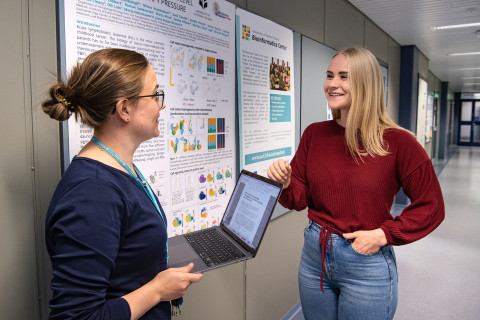Some cancer cells can survive chemotherapy, which poses a challenge to cancer treatment and may lead to cancer recurrence. According to a recent study, cancer cells are able to perform “an evasive maneuver”, i.e., transition to a drug-tolerant state, which causes some of them to survive drug treatment targeting the cell cycle in acute lymphoblastic leukemia. However, sequential targeting of the cell cycle and cell fate regulatory programs resulted in an effective treatment response.
Published in Genome Biology, the study was conducted in collaboration between researchers from the University of Eastern Finland, Karolinska Institutet, and Lund University in Sweden.
B-cell acute lymphoblastic leukemia (B-ALL), the most common childhood cancer, accounts for about 30% of all childhood cancers. Approximately 15–20% of patients continue to experience poor outcomes due to non-responsiveness to current chemotherapy or relapse after therapy. Moreover, the extended treatment protocols result in almost 80% of childhood ALL survivors having life-threatening medical complications by the age of 45.
Despite the promise of precision treatment, the diverse characteristics of cancer cells present limitations. “Our study employed advanced single-cell genomics, including scRNA-seq and scATAC-seq, alongside comprehensive biochemical and genomic analyses, to reveal that sequential drug treatment targeting the cell cycle and cell fate regulatory programs effectively blocks non-genetic evolution and drug tolerance in acute lymphoblastic leukemia,” says Doctoral Researcher Mari Lahnalampi of the University of the Eastern Finland Institute of Biomedicine.
In the study, treatment was targeted at the WEE1 kinase, which is a pivotal regulatory protein in cell cycle checkpoints. Various drugs that affect the cell cycle are used in the treatment of leukemia. According to the traditional view, the stem cell-like, undifferentiated properties of cancer cells make them resistant to treatments. However, the present study found that inhibition of WEE1 led some cancer cells to develop resistance, or drug tolerance, by promoting their differentiation.
Next, the researchers will be looking for drugs that target this state of drug tolerance. Sequential targeting of such drugs at the WEE1 inhibitor effectively prevented the development of drug tolerance and the recovery of cancer cells post-treatment, inducing cell death in pre-clinical models of leukemia.
“Our goal is to elucidate disease mechanisms that are related to aberrant regulation of cell states. These findings demonstrate that inefficient drug responses can be related to transitions into drug-tolerant cell states,” “ says Professor Merja Heinäniemi of the university of Eastern Finland Institute of Biomedicine..
The study sheds light on the intricate connections between gene regulation, cell cycle control and cell fate, providing a rationale for combining WEE1 inhibitors with other targeted therapies to enhance treatment efficacy while minimising side effects. Key collaborators of the study included the teams of Olle Sangfelt at Karolinska Institutet, Anna Hagstörm-Andersson at Lund University and Olli Lohi at Tampere University.
Key funders of the study include the Research Council of Finland, the European Research Council, Academy of Finland (321553, 310106), the European Union Horizon 2020 research and innovation programme, EASI-Genomics and ERA PerMed, Väre Foundation, Emil Aaltonen Foundation, Cancer Foundation Finland, Jane and Aatos Erkko foundation, and Sigrid Juselius foundation, the Swedish Childhood Cancer Fund, Swedish Cancer Society, the Swedish Research Council, the cancer Research Funds of Radiumhemmet, AstraZeneca.
Research article:
Malyukova A, Lahnalampi M, Falqués-Costa T, Pölönen P, Sipola M, Mehtonen J, Teppo S, Akopyan K, Viiliainen J, Lohi O, Hagström-Andersson AK, Heinäniemi M, Sangfelt O. Sequential drug treatment targeting cell cycle and cell fate regulatory programs blocks non-genetic cancer evolution in acute lymphoblastic leukemia. Genome Biol. 2024 May 31;25(1):143. doi: 10.1186/s13059-024-03260-4. PMID: 38822412; PMCID: PMC11143599.




